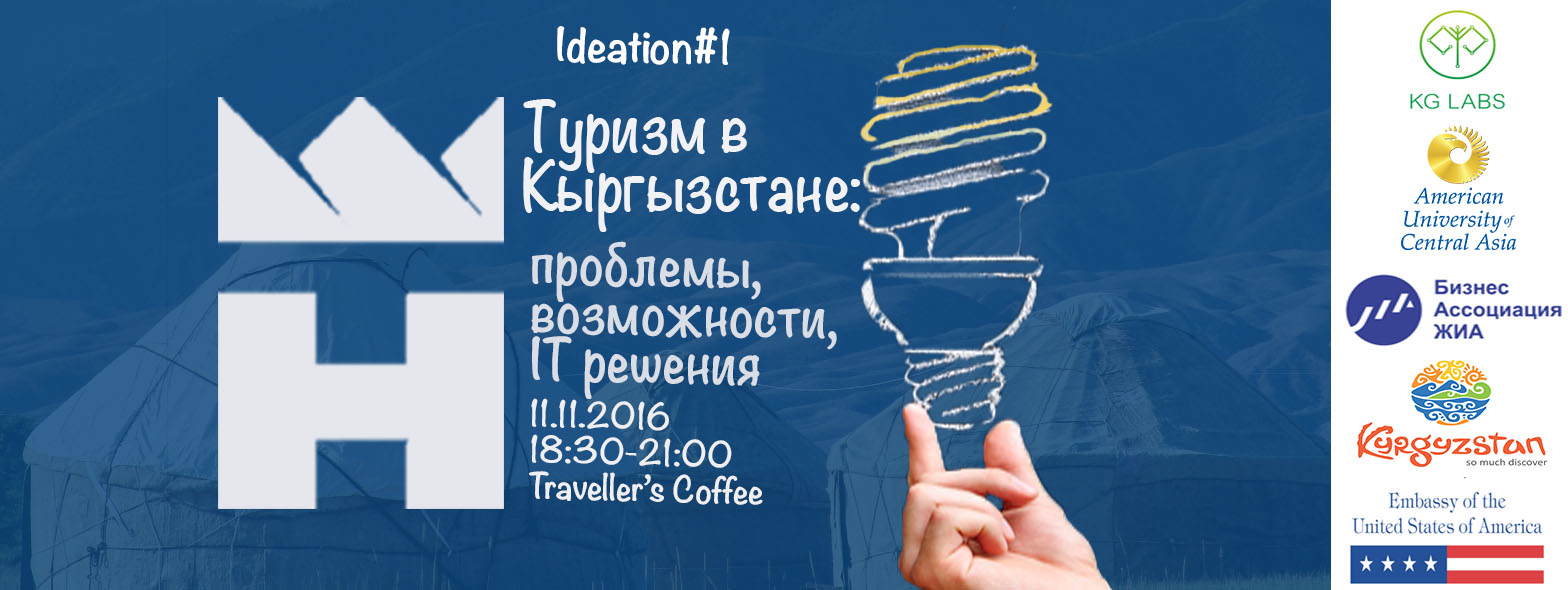
Travel&Tourism Ideation Session #1 announcement
2016-11-01
As part of the Travel & Tourism hackaton, KG Labs Public Foundation conducts a series of seminars for potential hackathon participants, where they can learn about current problems and challenges of the tourism industry, bottlenecks that need attention. As a result of these seminars, we expect that participants will be able to generate potential ideas / projects that they could implement on the hakaton.
In this connection, KG Labs Public Foundation is pleased to invite you to the first of four Ideation Session seminars where you can get a complete picture of the current situation in travel and tourism in Kyrgyzstan, get acquainted personally with experts and experts in these fields with whom you can discuss current problems tourist business.
The program includes speeches by well-known specialists of the tourism sector in Kyrgyzstan. The following speakers will share their experience in travel and tourism in Kyrgyzstan, will tell you how to become a professional in this field and answer your questions:
Marat Danilov, executive director of the NGO “Union of Pedestrian Tourism of Kyrgyzstan” will talk about problems, lack of appropriate advertising to attract tourists and the development of domestic tourism. And the speaker will share his impressions of the most interesting trips and trips of the Union.
Nurbek Saparov, executive director of the Kyrgyz Association of Tour Operators (KATO), about the importance of bills on visa-free travel for attracting more tourists and, in general, the role of the state in creating infrastructure in the tourism industry.
Razhiev Asylbek, Executive Director of the Kyrgyz Community Based Tourism Association, will talk about the peculiarities and potential of the tourism sector of our country, the role of families involved in ecotourism and how this practice in turn allows income for the inhabitants of the countryside and mountain areas and also the preservation of local culture and ecology.
Aziz Soltobaev, the head of the KG Labs Public Foundation, an expert in the field of technology projects and moderator of this meeting to share his knowledge about the existing in Kyrgyzstan technological projects in the field of travel and tourism in Kyrgyzstan.
Time and place: November 11, 18:30 at Traveler’s Coffee (Address: Baitik Baatyr 70 (between Mederov and Gorky). Admission is free, registration on the spot.
The organizers of the event are the KG Labs Public Foundation, whose mission is to promote technological entrepreneurship in the Kyrgyz Republic; American University of Central Asia, the leading innovation university in Central Asia. The partners of the project are the Business Association of Young Entrepreneurs “JIA”, as well as the Tourism Department of the Ministry of Culture, Information and Tourism of the Kyrgyz Republic. The project is supported by the Democratic Commission of the US Embassy in the Kyrgyz Republic.
We ask participants of the event to come in advance. Limited number of seats. Journalists are asked to pass the accreditation in advance by sending a request to Arina Aparina by e-mail. To aparinar@gmail.com until 10 November 2016, 18:00.
For more information, contact Diana Durusbek kyzy, coordinator of the project “Hackathon Travel and Tourism” by email. To the address: dianadurusbekkyzy@gmail.com
Please share these events with others, please use hashtags #Hackathonkg #travelhackkg #techkg #KGLabs #codeyourjourney
Program:
18.30 Registration of speakers and participants
19:00 Moderator’s welcome and presentation of speakers
Theme # 1: Introduction. General situation in the industry
Topic # 2: Current problems in the industry
Topic # 3: Opportunities in the industry
Topic # 4: IT solutions in the industry
19:30 – 20:00 question and answer session
20:00 Training “brainstorming method Silicon Valley”
20:10 Group formation and brainstorming practice
20:30 – 21:00 Networking
This project was funded by the US Embassy in the Kyrgyz Republic. The opinions, conclusions and conclusions or recommendations expressed herein are those of the authors and do not necessarily reflect the views of the Department of State.